Lyons W.C. (ed.). Standard handbook of petroleum and natural gas engineering.2001- Volume 1
Подождите немного. Документ загружается.

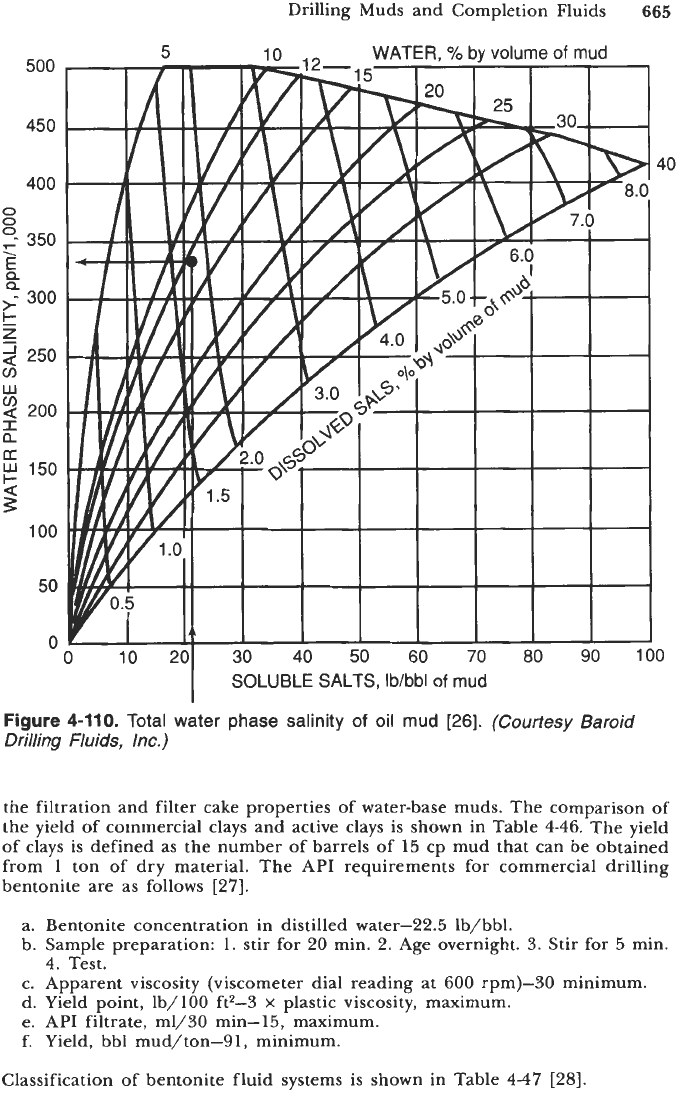
Drilling Muds and Completion Fluids
665
500
450
400
0
0
9
350
i
Q
E,
g
300
z
250
w
I
a
2
200
U
150
a
3
100
50
0
1
SOLUBLE
SALTS,
Ibhbl
of
mud
Figure
4-110.
Total water
phase
salinity
of
oil
mud
[26].
(Courtesy
Baroid
Drilling Fluids,
lnc.)
the filtration and filter cake properties
of
water-base muds. The comparison of
the yield of commercial clays and active clays is shown in Table
4-46.
The yield
of
clays is defined as the number
of
barrels of
15
cp mud that can be obtained
from 1 ton of dry material. The API requirements for commercial drilling
bentonite are as follows
[27].
a.
Bentonite concentration in distilled water-22.5 lb/bbl.
b. Sample preparation:
1.
stir for
20
min.
2.
Age overnight.
3.
Stir for
5
min.
c. Apparent viscosity (viscometer dial reading at
600
rpm)-30 minimum.
d.
Yield point, lb/lOO ft*-3
x
plastic viscosity, maximum.
e. API filtrate, m1/30 min-15, maximum.
f. Yield, bbl mud/ton-91, minimum.
4.
Test.
Classification
of
bentonite fluid systems is shown in Table
4-47
[28].
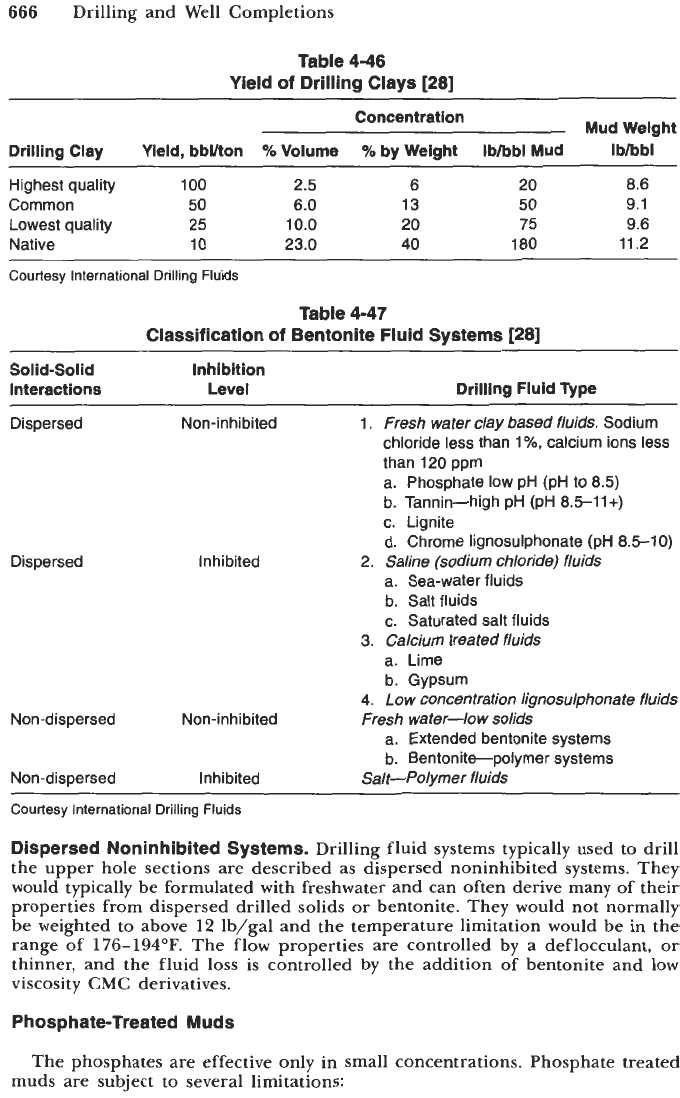
666
Drilling and Well Completions
Table
4-46
Yield of Drilling Clays
[28]
Concentration
Mud Weight
Drilling Clay Yield, bbVton
%
Volume
%
by Weight lmbl Mud lbbbl
Highest quality
100
2.5
6
20 8.6
Common
50
6.0
13 50 9.1
Lowest quality 25 10.0
20
75
9.6
Native
10
23.0
40
180 11.2
Courtesy International Drilling Fluids
Table
4-47
Classification of Bentonite Fluid Systems
[28]
Solid-Solid Inhibition
Interactions Level Drilling Fluid Type
Dispersed Non-inhibited 1.
Dispersed
In hi bited
Fresh water clay based fluids.
Sodium
chloride less than 1
%,
calcium ions less
than 120 pprn
a. Phosphate low pH (pH
to
8.5)
b. Tannin-high pH (pH 8.5-11+)
c. Lignite
d. Chrome lignosulphonate (pH
8.5-10)
Saline (sodium chloride) fluids
a. Sea-water fluids
b. Salt fluids
c.
Saturated salt fluids
Calcium treated fluids
a. Lime
b. Gypsum
Low concentration lignosulphonate fluids
Non-dispersed Non-inhibited
Fresh water-low solids
a. Extended bentonite systems
b. Bentonite-polymer systems
Non-dispersed Inhibited
Salt-Polymer fluids
Courtesy International Drilling Fluids
Dispersed Noninhibited Systems.
Drilling fluid systems typically used to drill
the upper hole sections are described as dispersed noninhibited systems. They
would typically be formulated with freshwater and can often derive many of their
properties from dispersed drilled solids or bentonite. They would not normally
be weighted to above
12
lb/gal and the temperature limitation would be in the
range
of
176-194°F.
The flow properties are controlled by a deflocculant, or
thinner, and the fluid loss is controlled by the addition of bentonite and low
viscosity
CMC
derivatives.
Phosphate-Treated Muds
The phosphates are effective only in small concentrations. Phosphate treated
muds are subject to several limitations:
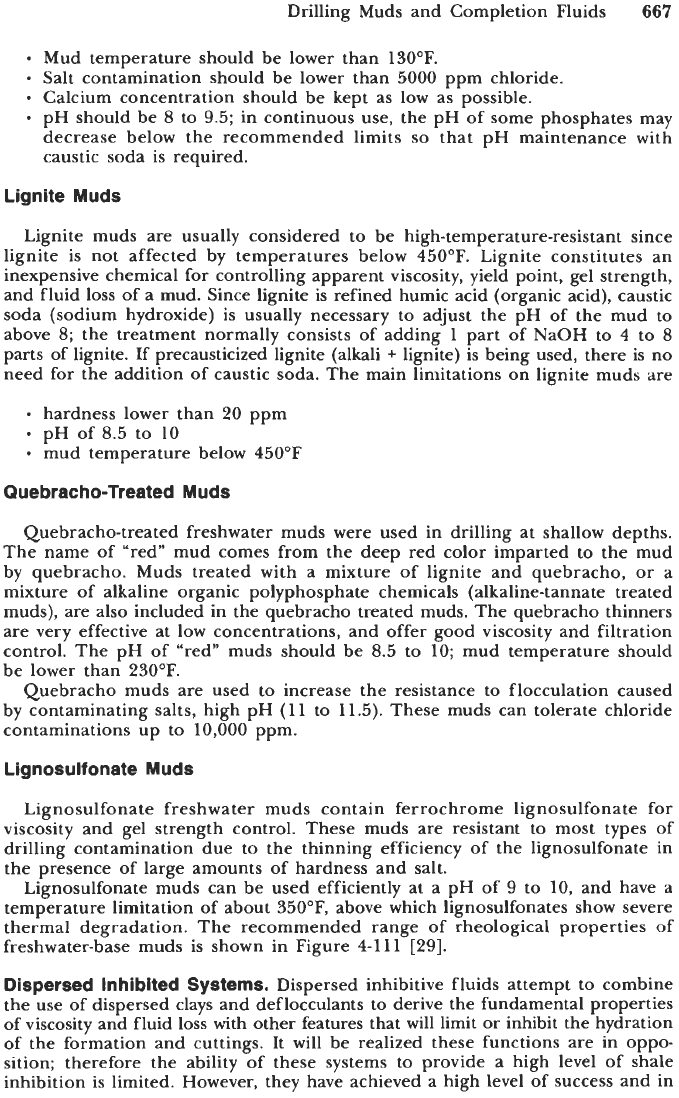
Drilling Muds and Completion Fluids
667
Mud temperature should be lower than
130°F.
Salt contamination should be lower than 5000 pprn chloride.
Calcium concentration should be kept as low as possible.
pH should be 8 to
9.5;
in continuous use, the pH of some phosphates may
decrease below the recommended limits
so
that pH maintenance with
caustic soda is required.
Lignite Muds
Lignite muds are usually considered to be high-temperature-resistant since
lignite is not affected by temperatures below
450°F.
Lignite constitutes an
inexpensive chemical for controlling apparent viscosity, yield point, gel strength,
and
fluid loss of a mud. Since lignite is refined humic acid (organic acid), caustic
soda (sodium hydroxide) is usually necessary to adjust the pH
of
the mud to
above
8;
the treatment normally consists of adding
1
part of NaOH to
4
to
8
parts
of
lignite. If precausticized lignite (alkali
+
lignite) is being used, there is no
need for the addition of caustic soda. The main limitations on lignite muds are
*
hardness lower than
20
ppm
pH of 8.5 to
10
mud temperature below 450’F
Quebracho-Treated Muds
Quebracho-treated freshwater muds were used in drilling at shallow depths.
The name of “red” mud comes from the deep red color imparted to the mud
by quebracho. Muds treated with a mixture
of
lignite and quebracho,
or
a
mixture of alkaline organic polyphosphate chemicals (alkaline-tannate treated
muds),
are
also included in the quebracho treated muds. The quebracho thinners
are very effective at low concentrations, and offer good viscosity and filtration
control. The pH of “red” muds should be 8.5 to
10;
mud temperature should
be lower than
230°F.
Quebracho muds are used to increase the resistance to flocculation caused
by contaminating salts, high pH
(11
to
11.5).
These muds can tolerate chloride
contaminations up to
10,000
ppm.
Lignosulfonate Muds
Lignosulfonate freshwater muds contain ferrochrome lignosulfonate for
viscosity and gel strength control. These muds are resistant to most types of
drilling contamination due to the thinning efficiency of the lignosulfonate in
the presence of large amounts of hardness and salt.
Lignosulfonate muds can be used efficiently
at
a pH of
9
to
10,
and have a
temperature limitation of about 35OoF, above which lignosulfonates show severe
thermal degradation. The recommended range of rheological properties of
freshwater-base muds is shown in Figure
4-111
[29].
Dispersed Inhibited Systems.
Dispersed inhibitive fluids attempt to combine
the use of dispersed clays and deflocculants to derive the fundamental properties
of viscosity and fluid loss with other features that will limit or inhibit the hydration
of the formation and cuttings. It will be realized these functions are in oppo-
sition; therefore the ability of these systems to provide a high level of shale
inhibition is limited. However, they have achieved a high level of success and in
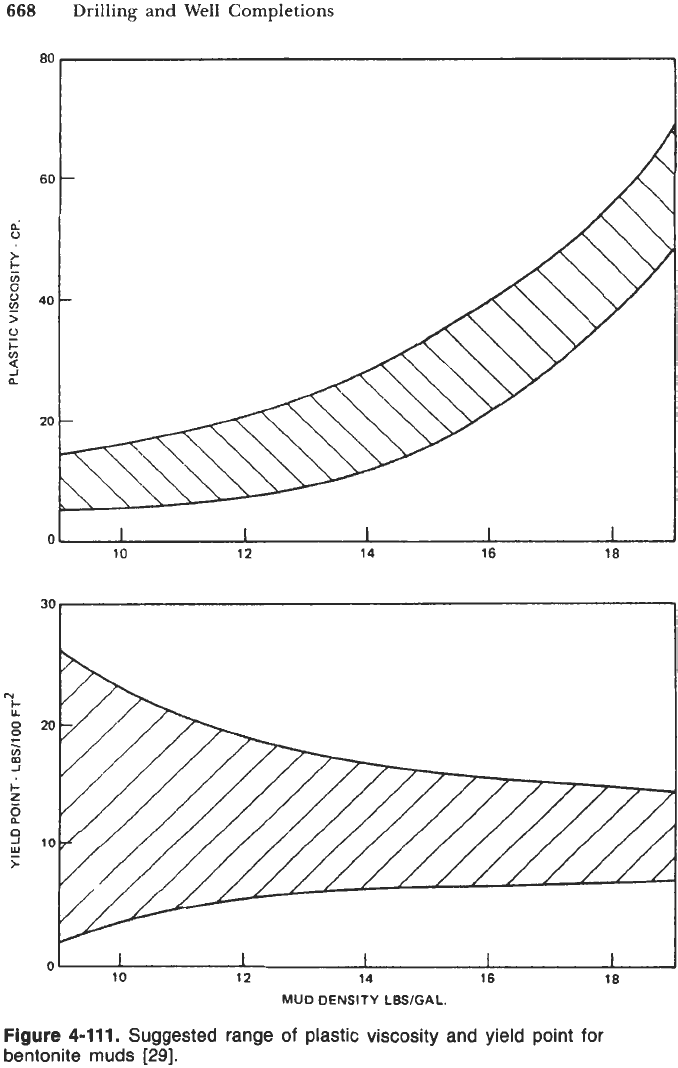
668
Drilling and Well Completions
d
t
u
>
!$
Y
4
>
V
t
-
v)
a
I
I
I
I
I
10
12 14 16 18
10
12 14 16 18
MUD
DENSITY
LBSIGAL.
Figure
4-111.
Suggested range
of
plastic viscosity and yield point for
bentonite muds
[29].
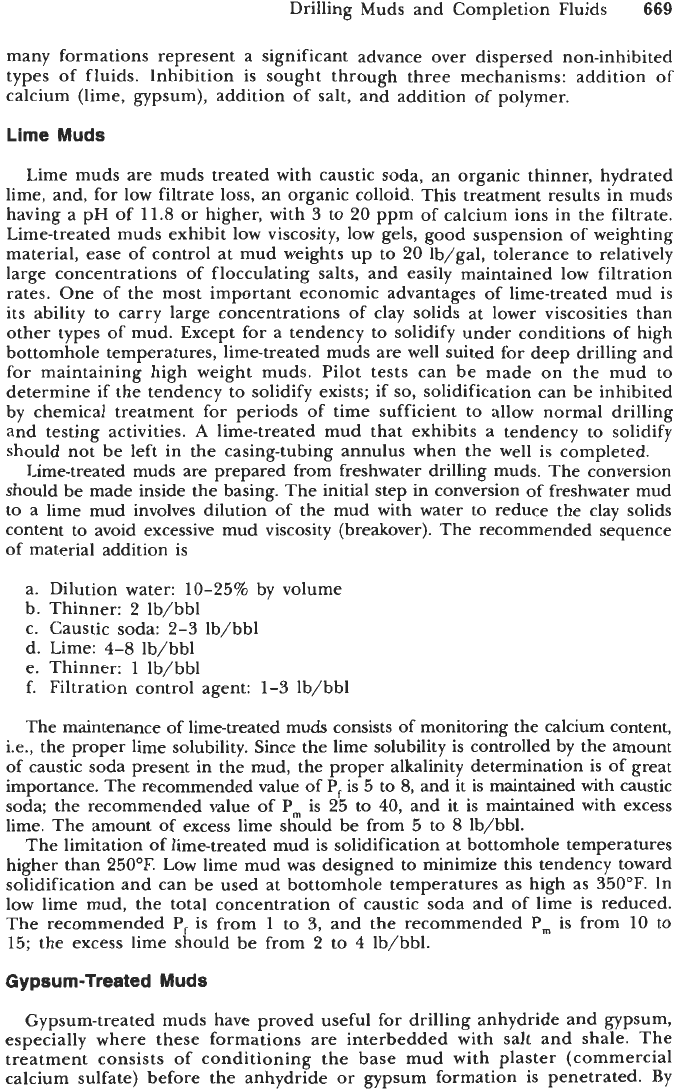
Drilling Muds and Completion Fluids
669
many formations represent a significant advance over dispersed non-inhibited
types of fluids. Inhibition is sought through three mechanisms: addition of
calcium (lime, gypsum), addition of salt, and addition of polymer.
Lime Muds
Lime muds are muds treated with caustic soda, an organic thinner, hydrated
lime, and, for low filtrate loss, an organic colloid. This treatment results in muds
having a pH of 11.8 or higher, with
3
to 20 ppm of calcium ions in the filtrate.
Lime-treated muds exhibit low viscosity, low gels, good suspension of weighting
material, ease of control at mud weights up to 20 lb/gal, tolerance to relatively
large concentrations of flocculating salts, and easily maintained low filtration
rates. One of the most important economic advantages of lime-treated mud
is
its ability to carry large concentrations of clay solids at lower viscosities than
other types of mud. Except for a tendency to solidify under conditions of high
bottomhole temperatures, lime-treated muds are well suited for deep drilling and
for maintaining high weight muds. Pilot tests can be made on the mud to
determine if the tendency to solidify exists;
if
so,
solidification can be inhibited
by chemical treatment for periods of time sufficient to allow normal drilling
and testing activities.
A
lime-treated mud that exhibits a tendency to solidify
should not be left in the casing-tubing annulus when the well is completed.
Lime-treated muds are prepared from freshwater drilling muds. The conversion
should be made inside the basing. The initial step in conversion of freshwater mud
to a lime mud involves dilution of the mud with water to reduce the clay solids
content to avoid excessive mud viscosity (breakover). The recommended sequence
of material addition is
a. Dilution water: 10-25% by volume
b. Thinner:
2
lb/bbl
c. Caustic soda: 2-3 lb/bbl
d. Lime: 4-8 lb/bbl
e. Thinner: 1 Ib/bbl
f.
Filtration control agent: 1-3 lb/bbl
The maintenance of lime-treated muds consists of monitoring the calcium content,
Le., the proper lime solubility. Since the lime solubility is controlled by the amount
of caustic soda present in the mud, the proper alkalinity determination is
of
great
importance. The recommended value of
Pf
is 5 to
8,
and it is maintained with caustic
soda; the recommended value of Pm is 25 to 40, and it is maintained with excess
lime. The amount of excess lime should be from
5
to 8 lb/bbl.
The limitation of lime-treated mud is solidification at bottomhole temperatures
higher than 250°F. Low lime mud was designed to minimize this tendency toward
solidification and can be used at bottomhole temperatures as high as
350°F.
In
low lime mud, the total concentration of caustic soda and of lime is reduced.
The recommended P,
is
from 1
to
3,
and the recommended
Pm
is from 10 to
15; the excess lime should be from 2 to
4
lb/bbl.
Gypsum-Treated
Muds
Gypsum-treated muds have proved useful for drilling anhydride and gypsum,
especially where these formations are interbedded with salt and shale. The
treatment consists of conditioning the base mud with plaster (commercial
calcium sulfate) before the anhydride
or
gypsum formation is penetrated.
By
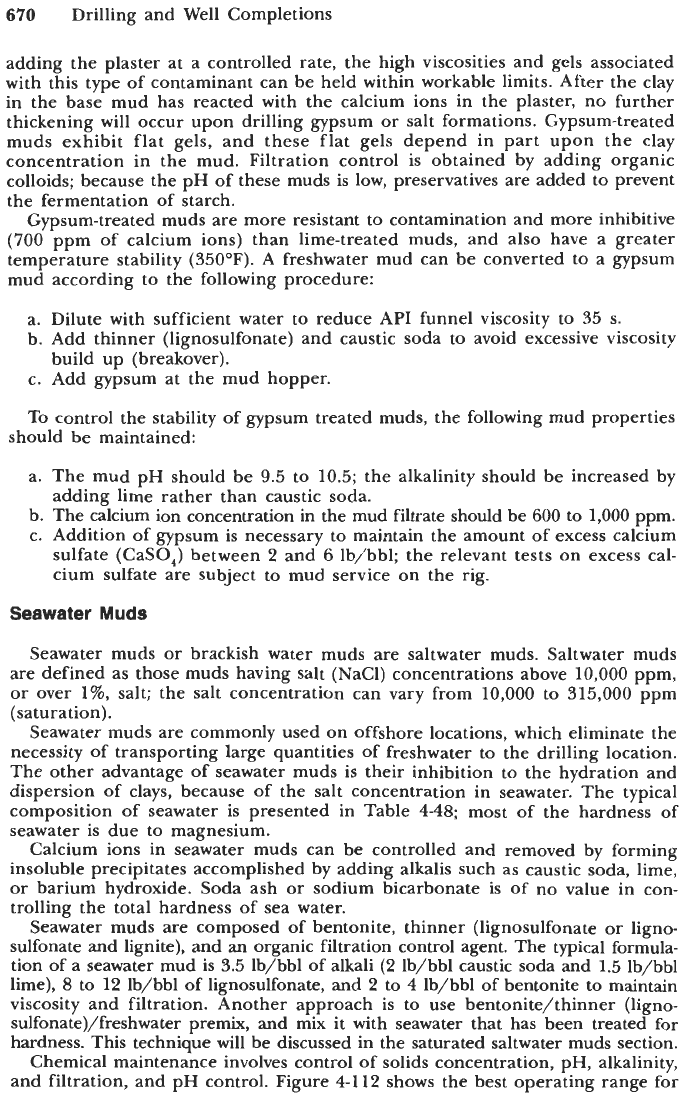
670
Drilling and Well Completions
adding the plaster at a controlled rate, the high viscosities and gels associated
with this type of contaminant can be held within workable limits. After the clay
in the base mud has reacted with the calcium ions in the plaster, no further
thickening will occur upon drilling gypsum or salt formations. Gypsum-treated
muds exhibit flat gels, and these flat gels depend in part upon the clay
concentration in the mud. Filtration control is obtained by adding organic
colloids; because the pH of these muds is low, preservatives are added to prevent
the fermentation of starch.
Gypsum-treated muds are more resistant to contamination and more inhibitive
(700
ppm of calcium ions) than lime-treated muds, and also have a greater
temperature stability (350°F). A freshwater mud can be converted to a gypsum
mud according to the following procedure:
a. Dilute with sufficient water to reduce API funnel viscosity to 35
s.
b. Add thinner (lignosulfonate) and caustic soda to avoid excessive viscosity
c. Add gypsum at the mud hopper.
To control the stability of gypsum treated muds, the following mud properties
build up (breakover).
should be maintained:
a. The mud pH should be
9.5
to
10.5;
the alkalinity should be increased by
b. The calcium ion concentration in the mud filtrate should be
600
to
1,000
ppm.
c. Addition of gypsum is necessary to maintain the amount of excess calcium
sulfate (CaSO,) between
2
and
6
lb/bbl; the relevant tests on excess cal-
cium sulfate are subject to mud service on the rig.
adding lime rather than caustic soda.
Seawater
Muds
Seawater muds or brackish water muds are saltwater muds. Saltwater muds
are defined as those muds having salt (NaCl) concentrations above
10,000
ppm,
or over
1%,
salt; the salt concentration can vary from
10,000
to 315,000 ppm
(saturation).
Seawater muds are commonly used on offshore locations, which eliminate the
necessity of transporting large quantities of freshwater to the drilling location.
The other advantage of seawater muds is their inhibition to the hydration and
dispersion of clays, because of the salt concentration in seawater. The typical
composition of seawater is presented in Table
4-48;
most of the hardness of
seawater
is
due to magnesium.
Calcium ions in seawater muds can be controlled and removed by forming
insoluble precipitates accomplished by adding alkalis such as caustic soda, lime,
or barium hydroxide. Soda ash or sodium bicarbonate is of no value in con-
trolling the total hardness of sea water.
Seawater muds are composed of bentonite, thinner (lignosulfonate or ligno-
sulfonate and lignite), and an organic filtration control agent. The typical formula-
tion of a seawater mud is 3.5 lb/bbl of alkali
(2
lb/bbl caustic soda and
1.5
lb/bbl
lime),
8
to
12
lb/bbl of lignosulfonate, and
2
to
4
lb/bbl of bentonite to maintain
viscosity and filtration. Another approach is to use bentonite/thinner (ligno-
sulfonate)/freshwater premix, and mix it with seawater that has been treated for
hardness. This technique will be discussed in the saturated saltwater muds section.
Chemical maintenance involves control of solids concentration, pH, alkalinity,
and filtration, and pH control. Figure
4-1 12
shows the best operating range for
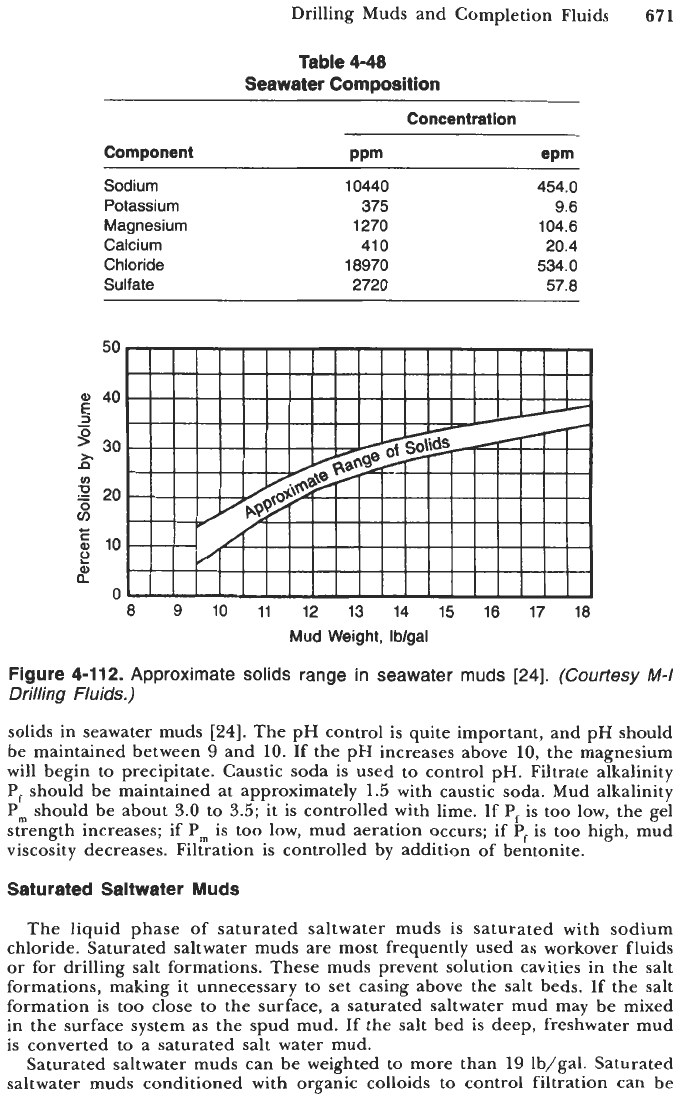
Drilling Muds and Completion Fluids
671
Tabk
4-48
Seawater Composition
Concentration
Component PPm ePm
Sodium
10440 454.0
Potassium
375
9.6
Magnesium
1270
104.6
Calcium
41
0
20.4
Chloride
18970
534.0
Sulfate
2720
57.8
Figure
4-112.
Approximate solids range in seawater
muds
[24].
(Courtesy
M-/
Drilling Fluids.)
solids in seawater muds
[24].
The pH control is quite important, and pH should
be maintained between
9
and
10.
If the pH increases above
10,
the magnesium
will begin to precipitate. Caustic soda
is
used to control pH. Filtrate alkalinity
P,
should be maintained at approximately
1.5
with caustic soda. Mud alkalinity
Pm
should be about
3.0
to
3.5;
it is controlled with lime. If
P,
is too low, the gel
strength increases; if
Pm
is
too low, mud aeration occurs; if
P,
is too high, mud
viscosity decreases. Filtration is controlled by addition of bentonite.
Saturated Saltwater Muds
The liquid phase
of
saturated saltwater muds
is
saturated with sodium
chloride. Saturated saltwater muds are most frequently used as workover fluids
or for drilling salt formations. These muds prevent solution cavities in the salt
formations, making it unnecessary to set casing above the salt beds. If the salt
formation
is
too close to the surface,
a
saturated saltwater mud may be mixed
in the surface system as the spud mud. If the salt bed is deep, freshwater mud
is converted to
a
saturated salt water mud.
Saturated saltwater muds can be weighted to more than
19
Ib/gal. Saturated
saltwater muds conditioned with organic colloids
to
control filtration can be
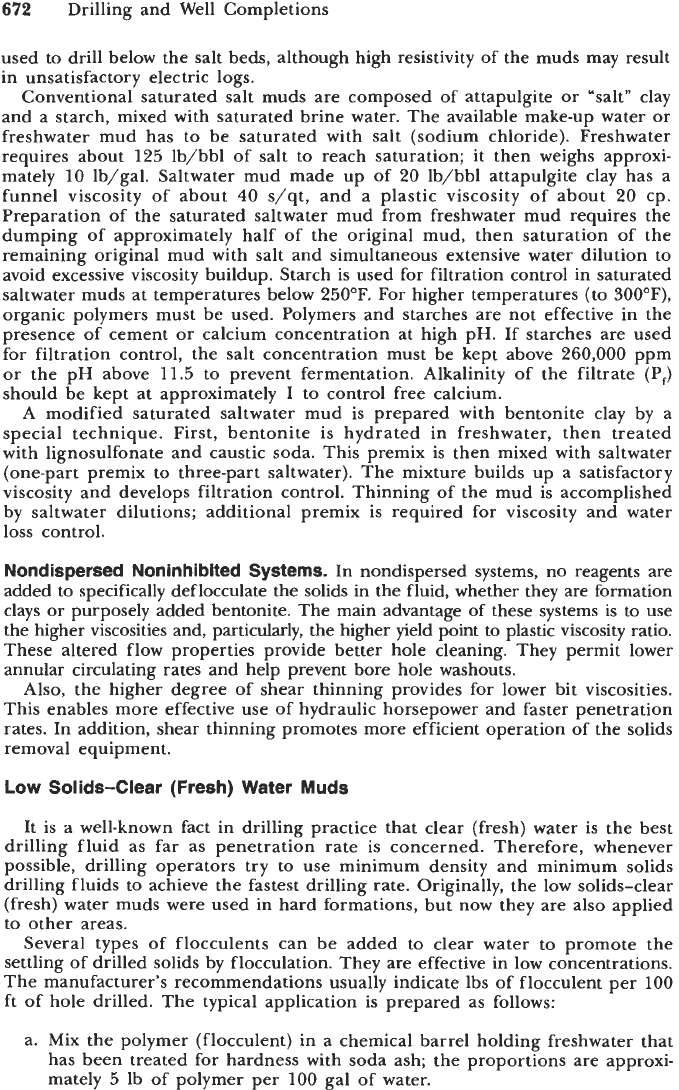
672
Drilling and Well Completions
used to drill below the salt beds, although high resistivity of the muds may result
in unsatisfactory electric logs.
Conventional saturated salt muds are composed of attapulgite
or
“salt” clay
and a starch, mixed with saturated brine water. The available make-up water or
freshwater mud has to be saturated with salt (sodium chloride). Freshwater
requires about 125 lb/bbl of salt to reach saturation; it then weighs approxi-
mately 10 lb/gal. Saltwater mud made up of 20 lb/bbl attapulgite clay has a
funnel viscosity of about
40
s/qt, and a plastic viscosity of about 20 cp.
Preparation of the saturated saltwater mud from freshwater mud requires the
dumping of approximately half of the original mud, then saturation of the
remaining original mud with salt and simultaneous extensive water dilution to
avoid excessive viscosity buildup. Starch is used for filtration control in saturated
saltwater muds at temperatures below 250°F. For higher temperatures (to 300”F),
organic polymers must be used. Polymers and starches are not effective in the
presence of cement
or
calcium concentration at high pH. If starches are used
for filtration control, the salt concentration must be kept above 260,000 ppm
or
the pH above 11.5 to prevent fermentation. Alkalinity of the filtrate (P,)
should be kept at approximately
1
to control free calcium.
A modified saturated saltwater mud is prepared with bentonite clay by a
special technique. First, bentonite is hydrated in freshwater, then treated
with lignosulfonate and caustic soda. This premix is then mixed with saltwater
(one-part premix to three-part saltwater). The mixture builds up a satisfactory
viscosity and develops filtration control. Thinning of the mud is accomplished
by saltwater dilutions; additional premix is required for viscosity and water
loss control.
Nondispersed Noninhibited
Systems.
In nondispersed systems, no reagents are
added to specifically deflocculate the solids in the fluid, whether they are formation
clays
or
purposely added bentonite. The main advantage of these systems is to use
the higher viscosities and, particularly, the higher yield point to plastic viscosity ratio.
These altered flow properties provide better hole cleaning. They permit lower
annular circulating rates and help prevent bore hole washouts.
Also, the higher degree of shear thinning provides for lower bit viscosities.
This enables more effective use of hydraulic horsepower and faster penetration
rates. In addition, shear thinning promotes more efficient operation of the solids
removal equipment.
Low
Solids-Clear (Fresh) Water
Muds
It is a well-known fact in drilling practice that clear (fresh) water is the best
drilling fluid as far as penetration rate is concerned. Therefore, whenever
possible, drilling operators try to use minimum density and minimum solids
drilling fluids to achieve the fastest drilling rate. Originally, the low solids-clear
(fresh) water muds were used in hard formations, but now they are also applied
to other areas.
Several types of flocculents can be added to clear water to promote the
settling of drilled solids by flocculation. They are effective in low concentrations.
The manufacturer’s recommendations usually indicate lbs of flocculent per 100
ft of hole drilled. The typical application is prepared as follows:
a. Mix the polymer (flocculent) in a chemical barrel holding freshwater that
has been treated for hardness with soda ash; the proportions are approxi-
mately 5 lb of polymer per 100 gal of water.
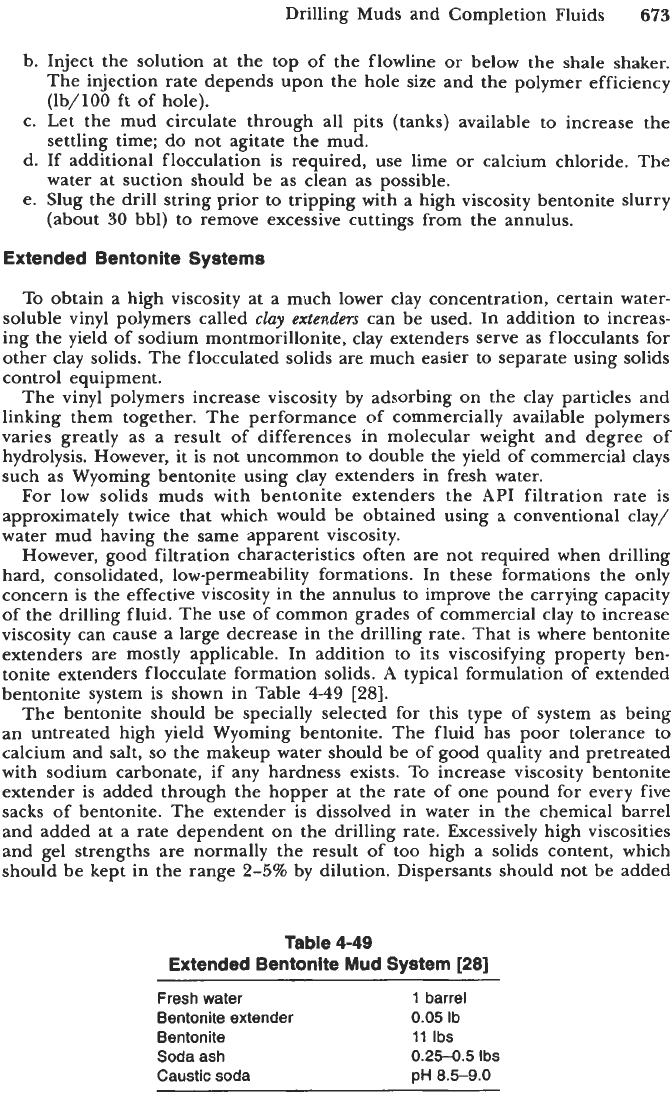
Drilling Muds and Completion Fluids
673
b. Inject the solution at the
top
of the flowline
or
below the shale shaker.
The injection rate depends upon the hole size and the polymer efficiency
(lb/lOO ft of hole).
c. Let the mud circulate through all pits (tanks) available to increase the
settling time; do not agitate the mud.
d.
If additional flocculation is required, use lime
or
calcium chloride.
The
water at suction should be as clean as possible.
e.
Slug the drill string prior
to
tripping with
a
high viscosity bentonite slurry
(about
30
bbl) to remove excessive cuttings from the annulus.
Extended Bentonlte Systems
To obtain a high viscosity at a much lower clay concentration, certain water-
soluble vinyl polymers called
chy
extenders
can
be
used. In addition to increas-
ing the yield of sodium montmorillonite, clay extenders serve as flocculants for
other clay solids. The flocculated solids are much easier to separate using solids
control equipment.
The vinyl polymers increase viscosity by adsorbing on the clay particles and
linking them together. The performance of commercially available polymers
varies greatly as a result of differences in molecular weight and degree of
hydrolysis. However, it is not uncommon to double the yield of commercial clays
such as Wyoming bentonite using clay extenders in fresh water.
For
low solids muds with bentonite extenders the
API
filtration rate is
approximately twice that which would be obtained using a conventional clay/
water mud having the same apparent viscosity.
However, good filtration characteristics often are not required when drilling
hard, consolidated, low-permeability formations. In these formations the only
concern is the effective viscosity in the annulus
to
improve the carrying capacity
of
the drilling fluid. The use of common grades of commercial clay to increase
viscosity can cause a large decrease in the drilling rate. That is where bentonite
extenders are mostly applicable. In addition to its viscosifying property ben-
tonite extenders flocculate formation solids.
A
typical formulation of extended
bentonite system is shown in Table
4-49
[28].
The bentonite should be specially selected for this type of system as being
an untreated high yield Wyoming bentonite. The fluid has poor tolerance to
calcium and salt,
so
the makeup water should be of good quality and pretreated
with sodium carbonate, if any hardness exists. To increase viscosity bentonite
extender is added through the hopper at the rate of one pound for every five
sacks
of
bentonite. The extender is dissolved in water in the chemical barrel
and added at a rate dependent on the drilling rate. Excessively high viscosities
and gel strengths are normally the result of too high a solids content, which
should be kept in the range
2-5%
by dilution. Dispersants should not be added
Table
4-49
Extended Bentonite
Mud
System
[28]
Fresh water
1
barrel
Bentonite extender
0.05
Ib
Bentonite
11
Ibs
Soda ash
0.25-0.5
Ibs
Caustic soda
pH
8.5-9.0
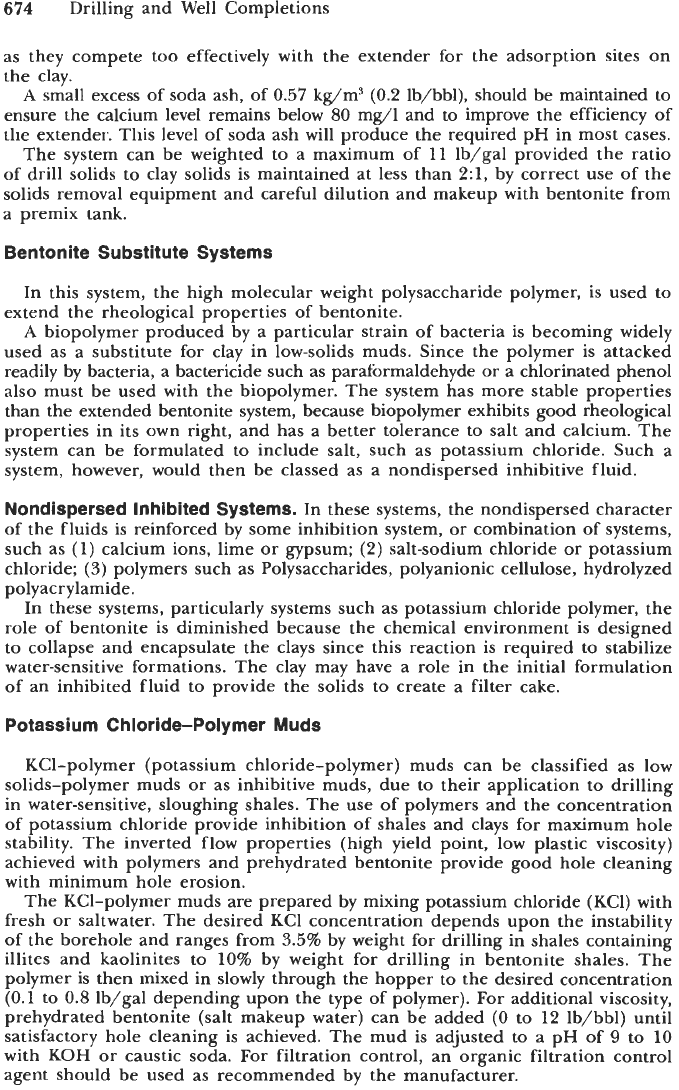
674
Drilling and Well Completions
as they compete too effectively with the extender for the adsorption sites on
the clay.
A
small excess of soda ash, of
0.57
kg/mq
(0.2
lb/bbl), should be maintained to
ensure the calcium level remains below
80
mg/l and to improve the efficiency of
the extender. This level of soda ash will produce the required pH in most cases.
The system can be weighted to a maximum of
11
lb/gal provided the ratio
of drill solids to clay solids is maintained at less than
21,
by correct use of the
solids removal equipment and careful dilution and makeup with bentonite from
a premix tank.
Bentonite Substitute Systems
In this system, the high molecular weight polysaccharide polymer, is used to
extend the rheological properties of bentonite.
A
biopolymer produced by a particular strain of bacteria is becoming widely
used as a substitute for clay in low-solids muds. Since the polymer is attacked
readily by bacteria, a bactericide such as paraformaldehyde
or
a chlorinated phenol
also must be used with the biopolymer. The system has more stable properties
than the extended bentonite system, because biopolymer exhibits good rheological
properties in its own right, and has a better tolerance to salt and calcium. The
system can be formulated to include salt, such as potassium chloride. Such a
system, however, would then be classed as a nondispersed inhibitive fluid.
Nondispersed inhibited Systems.
In these systems, the nondispersed character
of
the fluids is reinforced by some inhibition system, or combination of systems,
such as
(1)
calcium ions, lime or gypsum;
(2)
salt-sodium chloride
or
potassium
chloride;
(3)
polymers such as Polysaccharides, polyanionic cellulose, hydrolyzed
polyacrylamide.
In these systems, particularly systems such as potassium chloride polymer, the
role
of
bentonite is diminished because the chemical environment is designed
to collapse and encapsulate the clays since this reaction is required to stabilize
water-sensitive formations. The clay may have a role in the initial formulation
of an inhibited fluid to provide the solids to create a filter cake.
Potassium Chloride-Polymer Muds
KC1-polymer (potassium chloride-polymer) muds can be classified as low
solids-polymer muds or as inhibitive muds, due to their application to drilling
in water-sensitive, sloughing shales. The use of polymers and the concentration
of potassium chloride provide inhibition of shales and clays for maximum hole
stability. The inverted flow properties (high yield point, low plastic viscosity)
achieved with polymers and prehydrated bentonite provide good hole cleaning
with minimum hole erosion.
The KC1-polymer muds are prepared by mixing potassium chloride (KCl) with
fresh or saltwater. The desired KCl concentration depends upon the instability
of the borehole and ranges from
3.5%
by weight for drilling in shales containing
illites and kaolinites to
10%
by weight for drilling in bentonite shales. The
polymer is then mixed in slowly through the hopper to the desired concentration
(0.1
to
0.8
lb/gal depending upon the type of polymer). For additional viscosity,
prehydrated bentonite (salt makeup water) can be added
(0
to
12
lb/bbl) until
satisfactory hole cleaning is achieved. The mud is adjusted to
a
pH of
9
to
10
with KOH or caustic soda. For filtration control, an organic filtration control
agent should be used as recommended by the manufacturer.
